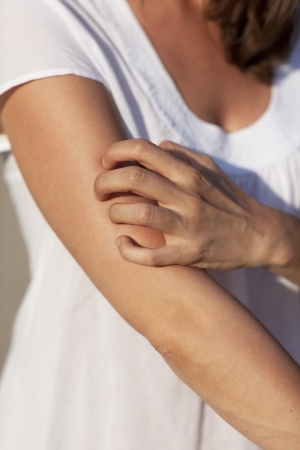 Lichen simplex chronicus is a condition that produces extreme itching and skin thickening. It develops in response to repeated scratching and rubbing of the affected skin. Over time, it leads to skin thickening, bleeding, cracking and possible infection.
Lichen simplex chronicus is a condition that produces extreme itching and skin thickening. It develops in response to repeated scratching and rubbing of the affected skin. Over time, it leads to skin thickening, bleeding, cracking and possible infection.The condition, which is a severe form of atopic dermatitis or eczema, affects the outer female genitalia (vulva) and anus and can also develop on other parts of the body including the arms, neck, legs and scalp. It can be found on any body part that is easily scratched.
The underlying cause of lichen simplex chronicus is unknown, but the typical itch – scratch – itch cycle common to lichen simplex chronicus is often triggered by:
- Stress
- Anxiety
- Skin conditions such as dry skin, eczema or psoriasis
- Scarring
- Skin irritants
- Insect bites
- Infection
Individuals with lichen simplex chronicus develop oval or linear shaped skin plaques. The patches are dry and scaly and produce a fierce itch, which can interfere with sleep. Nighttime scratching while sleeping is also common and can cause the condition to worsen.
To determine the triggering factor of the condition, a skin biopsy or allergy Patch test may be performed in your gynecologist’s office. Treatment of vulvar lichen simplex chronicus depends on the causative factor and is focused both on stopping the chronic itch cycle and treating the underlying condition.
Treatment options include hormonal creams, topical steroid creams, vaginal moisturizers, systemic immunosuppressive therapies or other topical medications that work to soften the skin and control the itch. Since vulvar skin is thin, less potent topical products may be substituted for stronger preparations and used for a longer period of time. Your OB/GYN may also suggest the use of oral antianxiety medications such as Benadryl (diphenhydramine) or Atarax (hydroxyzine).
Lichen Simplex Chronicus is a chronic condition, so periodic treatment will likely be required over a lifetime.





